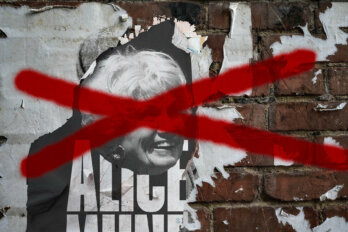Idiscovered Milan Kundera at the age when his work is most appealing and most dangerous. At seventeen, I could still assume beautiful phrases were true ones and take characters as guides for living. It’s probably not fair to blame The Unbearable Lightness of Being for my disastrous first relationship. But the Czech novelist’s death this past July has me thinking about the male writers whose words have shaped my psyche and whether it’s time to shake them off.
Censored in Czechoslovakia after the Soviets invaded in 1968, Kundera spent most of his career in exile in France. Where his early novels critiqued communist repression, his most famous book, 1984’s The Unbearable Lightness of Being, begins with a more universal meditation on choices: we can never know if we’ve made the right ones because we can’t see what would have happened if we had taken a different path. “What can life be worth if the first rehearsal for life is life itself?” he asks, deflating the shallow optimism of YOLO with a dose of Nietzsche’s eternal return to suggest that events risk being meaningless if they never repeat.
Such queries flattered my teenage existentialism and sent me to the mall to buy a copy of Beyond Good and Evil. Yet I found straight-up philosophy less compelling than Kundera’s heady mix, as he combines abstract reflections with a whole lot of sex and explores the dilemma of choice through two parallel relationships. The womanizing doctor, Tomas, and his long-suffering wife, Tereza, stay together in a soup of poetic misery. Sabina, a divorced artist first introduced as one of Tomas’s mistresses, has an affair with a married professor but takes off once he’s ready to commit. So should you try to make an imperfect relationship work or strike out on your own? Either way, you’ll have doubts, Kundera suggests, and then you’ll die.
If this Czech interloper succeeded in dethroning Margaret Atwood as my hero of the moment, it was largely because of Sabina. While Tereza, plagued by her husband’s infidelities, struck me as irredeemably pathetic, Sabina was an edgy counterpoint to my suburban upbringing by parents who had been together since high school. Here was a woman immune to social convention, who eschewed child bearing for painting and drifted from Prague to Geneva and the United States. She approached gender with an indifference that I applauded: it was “her unchosen fate,” neither merit nor failure, such that “to rebel against being a woman seemed as foolish to her as to take pride in it.” I saw in her an individuality and a strength that I wanted to cultivate and an approach to relationships with men where she remained the protagonist and dealt the wounds rather than received them.
That year, I entered university and began dating for the first time, matching up with an international student who was older than me and a bit aloof but good looking enough to erase my days as a high school nerd. After six months of lukewarm coupledom and the unromantic shedding of my virginity, he informed me that he was reuniting, long distance, with a woman in the Netherlands he had met during an exchange. High on Kundera, I did not take this as my cue to leave. I was early in my exploration of sexuality and proud that my attachment had remained moderate, so I imagined a less formal connection as both honest and empowering. Of course, the idea that we would keep sleeping together suited him just fine.
It worked for a while; I even agreed to be introduced, incognito, to his reappointed girlfriend when she visited, in a move that I thought was transgressive at the time but that now seems sadistic. Yet for all my admiration of Sabina, I was not a divorced artist schooled in the complexities of adult existence. A few months later, I fell in love with him, and what followed was the kind of mess that challenges succinct narration. I confessed my feelings, we split up, he lured me back by dropping the girlfriend but simultaneously started seeing another woman, French this time, whom, like the first, he praised for being thinner and more feminine than me. (I responded by losing weight and adopting skirts.) We swung through a year of ruptures and reconciliations. In that time, I learned all about discreet weeping in public bathrooms, the corrosive effects of being told half-truths, and the treatment for chlamydia, which Kundera’s characters somehow never had to worry about. Eventually, I escaped on an exchange to Europe myself. Even then, for the next year and a half, most of our encounters were marked by fraught hookups, until he admitted the French woman was still around and I cut him off.
In the aftermath, The Unbearable Lightness of Being moved from a justification for this relationship to a shorthand for its progression: I had wanted to be Sabina and ended up closer to Tereza, whose torment gives her nightmares about stabbing needles under her fingernails but who can’t quite detach herself from the man who makes her feel so weak. My heartbreak was complicated by guilt and the shameful sense that I had earned my own pain through a kind of emotional hubris.
But what if the book itself was part of the trap? Kundera never condemns the dishonesty or betrayals of his male characters, instead taking them as starting points for philosophical reflection. Maybe this approach made me too tolerant of my first lover, curious about behaviour I was better off denouncing. Had I stuck to the country songs of my childhood, I might have concluded that a man who lies to his partners and keeps an anguished mistress on the hook is not particularly interesting: mostly, he’s just selfish. Had Kundera’s aestheticized take on toxicity led me to mistake dating an asshole for a good story?
Art’s harmful potential is an old idea: Plato expelled poets from his imagined Republic because he believed their pretty words distorted young people’s sense of justice. As an undergraduate student, I never would have subordinated literature to morality. Edifying books were for children, and ethical ambiguity was a marker of intelligence. Kundera’s status as my favourite writer was thus challenged by the South African J. M. Coetzee, whose elliptical work netted him a Nobel but is difficult to pin down politically.
My point of entry, the Booker-winning novel Disgrace, revolves around David Lurie, a professor of Romantic poetry who coerces a young female student into sex. Understandably, the 1999 novel enjoyed renewed attention after the #MeToo movement made its protagonist’s stomach-turning behaviour more legible. The self-described “servant of Eros” first manages to sleep with Melanie by catching her off-guard: he extracts her phone number and address from the administrative office, invites her to lunch, and capitalizes on her confusion. The second incident qualifies as rape, even if Lurie insists it is “not quite that.” He arrives at her apartment unexpected and forces his way in, ignoring a verbal “no” and body language that suggests “she had decided to go slack, die within herself for the duration.” Jia Tolentino has examined Lurie as a parallel to Harvey Weinstein, both as cautionary tales about the dangers of “power exerted without consideration of humanity.”
Back in 2006, I was more sympathetic to the professor. My term paper on Disgrace blamed Lurie’s attachment to Romantic poetry for his destructive choices. I did not heed this implicit warning about confusing art with reality in my own life. Nor did I consider that Lurie might be using literature as an alibi for his behaviour. But I wasn’t exactly misreading the novel either, which reflects at length on whether Lord Byron and Lurie’s other “masters” have guided him well. Indeed, because Coetzee adopts the professor’s perspective, these concerns receive more attention than Melanie’s suffering, which is buried in the subtext. (She withdraws from university, and a rumour about sleeping pills implies a suicide attempt.) I paid little attention to this minor character, despite sharing her age and position. After all, I had been trained not to speculate beyond the bounds of the text.
With all his subtlety, Coetzee provided dubious preparation for real-life sexual harassment scandals, as literary giants I admired turned out to have track records of abuse. For me, the most significant was Derek Walcott, the Nobel Prize winner from St. Lucia. As a poet and playwright, Walcott became a star of postcolonial literature for combining technical mastery with a confident commitment to the local. When he visited the University of Alberta in the fall of 2008, I was starstruck. I ended up specializing in Caribbean literature and spent the next decade wandering from country to country.
Yet my affection for Walcott could have been short lived. Six months after I saw him in Edmonton, his history of sexual harassment sprang into the public eye. The setup was juicy. Walcott was a candidate for the position of poetry professor at Oxford, and a few weeks before the vote, someone anonymously sent dozens of academics photocopied pages from the book The Lecherous Professor that described an alleged 1982 incident between him and a student. A competitor for the job, Ruth Padel, was revealed to have tipped off journalists about Walcott’s past. The Caribbean poet withdrew amidst what he called “a low and degrading attempt at character assassination,” and Padel herself resigned nine days after being elected to the post. A contemporary New Yorker article dubbed the drama a “gender war.”
The controversy dug up two cases against Walcott with striking similarities. In 1982, while he was a visiting professor at Harvard, a freshman student accused him of giving her a C to punish her for refusing his advances. Harvard changed the grade and admonished the writer, who admitted to propositioning the student but did not accept fault. In 1996, a graduate student at Boston University sued Walcott for threatening to block a production of her play after she turned him down. The case was settled out of court. This second accuser, Nicole Kelby, now a novelist, gave an interview to the Daily Mail during the Oxford scandal that makes for a bewildering read. Kelby dropped out of the program in despair, and her second marriage broke down under the strain. When she sued, she claims, the university hired a detective to prove she was promiscuous and her colleagues stigmatized her so much she later moved states. Yet, over a decade later, Kelby had forgiven Walcott and seemed to hold out hope that it had all been a joke. As she said, “I don’t want to think that this man in whom I placed so much trust, and for whom I had so much affection, would actually barter sex for favours.”
I was happy to give Walcott a pass too, and I was not alone in reaching this conclusion: my alma mater brought him back as a distinguished scholar in residence, right after the Oxford controversy, to work with undergraduates. But why was I so nonplussed by such stories? I was no puritan, and I knew desire could be unruly and relationships messy. Perhaps I thought that artists, like their works, enjoyed a certain moral leeway if they were impressive enough. Above all, though, I suspect I found it more comfortable to identify with powerful men than to imagine myself as a potential target.
Many of today’s students have different instincts. In 2019, I taught my first course on Caribbean literature as an adjunct professor at Concordia University. I opened with Walcott’s poem “The Sea Is History,” which seemed to go over well, but made the error of following up with the American writer David Foster Wallace, best known for Infinite Jest. I’d assigned his essay “Shipping Out,” which satirizes the luxury cruise, alongside Jamaica Kincaid’s A Small Place, a polemical takedown of tourism as an extension of colonialism. The pairing was meant to set Wallace up for a fall based on content; Kincaid, an Antigua-born writer who now teaches at Harvard, delivers a far more historicized vision of the region. Instead, the first student I called on delivered a scathing account of Wallace stalking fellow writer Mary Karr. Another student called out Walcott shortly after.
I stumbled through that class and spent the next week ranting to friends about the dogmatism of activist youth. Did they expect me to curate a new literary history based on moral virtue instead of talent? Wait till I told them that Kincaid supported Israel, and feminist icon Simone de Beauvoir had seduced her underage female students. Besides, Walcott and Wallace were both dead by then. What happened to separating the art from the artist? Of course, my defensiveness was a mask for panic. I felt I was one misstep away from a social media scandal and one bad set of course evaluations away from unemployment.
In the end, that course went fine. The “activists” proved perfectly capable of nuanced thinking, and my evaluations came out strong. Retrospectively, I also respected the daring of the students who tore into the writers I’d chosen for them. I might have felt relieved instead of threatened: this cohort appeared far less likely to tolerate behaviour that, at their age, I had rationalized under the banner of human fallibility. Maybe they were also better defended against predation. But I was still stuck with the question of how to teach problematic writers, and I was startled to realize it was my call to make. Despite the precarity of my job, and the persistence of my own flawed humanity, I was on the side of power now.
This year, I reread The Unbearable Lightness of Being for the first time in close to two decades. I had opted to include it in a mandatory class on contemporary literature at a Montreal CEGEP that caters to students in their late teens. Such is the challenge of teaching required courses that my concern about encouraging unhealthy relationships paled next to the hope that the book might generate enthusiasm.
The novel was far more political than I remembered, with plot points revolving around the 1968 crushing of the Prague Spring and communist censorship. But I was pleased to find that the touchstone of my youth remained, in a basic way, good. Kundera’s aesthetic approach to existence had retained its potency, as he insists that we compose our lives like music, turning random happenings into personal motifs and following “the laws of beauty even in times of greatest distress.” Yes, I thought, this is why I embraced literature with a quasi-religious fervour at an age when I was losing faith in a more literal god. The notion of crafting my life like a novel was a way of holding onto meaning and coherence, if of a more provisional sort.
As for the character of Sabina, she seemed more melancholy to me now. Most of all, I was surprised by Tereza. I’d forgotten that she grew up in a provincial town, that she was younger than Tomas and turned to him because he promised to take her elsewhere, out of her family’s world and into the more exalted spheres of Prague. I’d forgotten that she yearned for “something higher,” which led her to classical music and photography as a means of transforming herself. And I understood a little better my resistance to discarding literary works on the grounds that they can be bad for you. At seventeen, I did not want to be a better person; I wanted to be a more complicated one. That impulse brought me a lot of pain. Perhaps, though, I could be more generous in my evaluation of a young woman whose thirst for experience led her into a reckoning with her own vulnerability. There’s no knowing what would have happened had she chosen differently.
I repeatedly warned my students against taking Kundera as any kind of romantic advice. We discussed the novel’s attitude toward fidelity, because depictions of cheating are a surefire way to get teenagers to talk. But I banned them from writing papers attacking Tomas, for the same reason that I hesitate to dedicate too much space to my first boyfriend. While I feel no need to defend either, I worry the critiques would be shallow, more an attempt to establish righteousness than to understand. For at least some of my students, Kundera’s charm seemed to hold. One of them enthused about the book, telling me she’d passed it on to a friend and asking for recommendations in the same vein. She has a lightly Gothic edge to her aesthetic that stands out against the suburban norms of my college. I hope she’s wiser than I was and will be kind to herself about her mistakes.
Walcott appeared on that syllabus too, in a way. In a moment of ambition, I assigned Michelle Cliff’s No Telephone to Heaven. The Jamaican American writer’s novel is a dense bildungsroman that criss-crosses continents and chronologies, incorporating Jamaican patois and folklore alongside scenes of shocking violence. I chose the book for its poetic voice as well as the conversations it enables: about colonialism and racial identity, class and corruption, gender and the representations of queer and trans characters. (Cliff herself was the long-term partner of poet Adrienne Rich.) The novel exhibits the kind of moral complexity I still find compelling. Yet I also figured the students might benefit from following a protagonist close to their age as she grapples with how education can be as alienating as it is empowering.
Cliff uses lines from Walcott’s poem “Laventille” as an epigraph. If he’d been more central, we may have paused to debate his past, and I may have reminded them about the reporting mechanisms for sexual harassment. As it was, we lingered on his words a while and then moved on to the main event.





